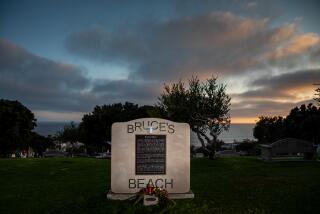Judge Rules Brea Improperly Seized Downtown Property : Redevelopment: In another setback for city’s plans, officials are ordered to hold a hearing over the eviction of a man from his downtown warehouse in 1992 and the relocation of a church there.
- Share via
SANTA ANA — A Superior Court judge on Wednesday set aside a decision by Brea officials to seize an inventor’s commercial warehouse to relocate a church there as part of the city’s efforts to remake its aging downtown.
Ruling in one of the most contentious cases in Brea’s redevelopment project, Judge Leonard Goldstein found that city officials may have violated “the separation of church and state concepts in both federal and state constitutions” when they seized property owned by Michael Kunec, a 75-year-old inventor who is legally blind.
The judge ordered that city officials start from scratch and hold a “fair, legal and impartial hearing” for Kunec, who was evicted from his workshop in 1992 so that the city could turn over the property to the International Church of the Foursquare Gospel.
Sue Georgino, the city’s redevelopment agency director, said Wednesday that Brea officials would withhold comment on the judge’s decision until they consult their attorneys.
“We have problems with it, but there are other things we can do,” Georgino said, declining to elaborate.
Kunec’s lawyer, Michael Leifer of Irvine, said he was pleased with the judge’s decision, but also declined to comment further.
Goldstein’s ruling is the latest in a series of setbacks that has dogged Brea’s redevelopment efforts. Since 1985, the city has been buying downtown properties and displacing longtime owners to make way for a supermarket, a cluster of town houses, a movie theater complex and a tree-lined strip of shops and restaurants.
Some of the property owners have sued the city in what turned into a vicious war of words and writs to keep their land.
City officials have stated that the acquisition of Kunec’s and surrounding properties through the eminent domain process is necessary to transform a tattered and run-down city core into a vibrant, tax-producing downtown. Brea leaders concede there have been trouble spots along the way, but say that most of the problems occurred during previous administrations.
During the last five years, three City Council members involved in the process of property acquisitions have either lost their seats or their right to vote on redevelopment, following conflict-of-interest charges.
In recent months, some former property owners said they were interviewed by FBI agents who wanted to know if they were coerced into selling to the city. FBI officials have declined to comment on the nature of the investigation.
City officials have repeatedly denied any wrongdoing and say they are being unfairly tarred by greedy property owners.
In December, 1991, the Brea Redevelopment Agency decided to condemn Kunec’s property at 109 N. Brea Blvd. and to give it to the Foursquare Church, whose downtown property city officials acquired for the redevelopment project.
Kunec has waged a tenacious legal battle to be compensated for his warehouse, once a cluttered workshop where he tinkered with his inventions. He has been credited with inventing a blood pump used in heart surgery, developing devices for preventing infant crib deaths and creating a keyboard for teaching blind children to use computers, according to court documents filed by his attorney.
Before seizing the warehouse, the city valued the inventor’s property at $210,000. Kunec, who is unable to drive a car, said he needed about $450,000 to find a replacement location in an area with public transportation. Because the case has been in dispute, the owner has not yet received any compensation for his property.
*
After the city filed its eminent domain action in civil court, Kunec filed a countersuit alleging that the city illegally took his land.
During a non-jury trial before Goldstein last year, Leifer cited internal city memoranda showing that Kunec’s property was “reserved for the church” by city officials as early as 1990. The lawyer contended that both the state and federal constitutions prevented the city from acquiring the property for religious purposes.
While the legal battle between the city and Kunec sizzled, the Foursquare Church was temporarily relocated to prefabricated building just down the street from Kunec’s property. The judge’s decision would further delay their plans to build a structure on Kunec’s property.
Church officials did not testify during the case.
More to Read
Sign up for Essential California
The most important California stories and recommendations in your inbox every morning.
You may occasionally receive promotional content from the Los Angeles Times.













